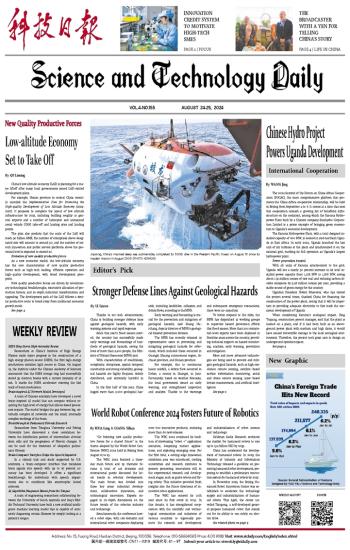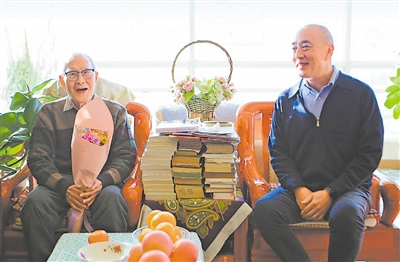
 Innovation Credit System to Motivate High-tech SMEs
Innovation Credit System to Motivate High-tech SMEs The Broadcaster with a Yen for Telling China's Story
The Broadcaster with a Yen for Telling China's Story Low-altitude Economy Set to Take Off
Low-altitude Economy Set to Take Off PHOTO NEWS
PHOTO NEWS Stronger Defense Lines Against Geological Hazards
Stronger Defense Lines Against Geological Hazards Chinese Hydro Project Powers Uganda Development
Chinese Hydro Project Powers Uganda Development WEEKLY REVIEW
WEEKLY REVIEW New Graphic
New Graphic World Robot Conference 2024 Fosters Future of Robotics
World Robot Conference 2024 Fosters Future of Robotics
 |
| Soeda Shuhei (Left) and his son, Soeda Takehito. (COURTESY PHOTO) |
When Soeda Shuhei and his wife Hiroko Utsumi were passing through Beijing on their way to the Soviet Union in 1963, little did they know that the stopover would become their destination and they would dedicate themselves to broadcasting China's stories to Japan and to promoting Sino-Japanese friendship.
Shuhei, then 34 years old, was passionate about Russian literature and intended to work in the Soviet Union. However, due to the complexity of the application process, he had to abandon his plan and stayed in Beijing. Eventually, both he and Utsumi were offered jobs at Radio Beijing, which later became China Radio International (CRI).
They were in the Japanese language department, first working as Japanese newscasters, hosting news and current affairs programs.
They were among the first Japanese to work in Japanese language broadcasting in China. Shuhei's attractive voice made a deep impression on his Japanese listeners. Through his news broadcasts, the Japanese people's understanding of China improved.
Shuhei also hosted many special programs such as "History and Characters", which became a star program. It was structured as a radio play based on Chinese historical figures and events in Chinese history, and was regarded as both intellectual and interesting by Japanese listeners. It served as a bridge between the two countries, sharing the wisdom of the ancient Chinese.
Shuhei was known for his dedication to his work. During his more than 30 years at the station, he and Utsumi always came to work an hour earlier.
On July 28, 1976, a massive earthquake struck Tangshan, a city 200 kilometers from Beijing. There were strong tremors in Beijing as well. The CRI team set up 24-hour broadcasts by relay teams so that if there were any casualties, it would be reported immediately. Shuhei and Utsumi stayed with their Chinese colleagues. "Since the Chinese stayed and continued their work, how could we rush to our own safety," Shuhei said.
As Japan is an earthquake-prone country, he said he understood the importance of broadcasting during such a difficult time when people's only source of information was the radio. He felt a strong sense of responsibility that made it impossible for him to leave the station.
In addition to his work, Shuhei also devoted a lot of time to training young Chinese broadcasters. Many of his students became the backbone of Japanese broadcasting in China and said they owed their professional success to him.
Shuhei was named as one of the "Most Influential Overseas Experts in China Over the Past Six Decades" in 2009 and was once received by Premier Zhou Enlai. Looking back, he said it was Premier Zhou who inspired him to stay in China.
"Broadcasting to Japan is very important, if China stops broadcasting to the outside world, it will affect China's image in the world, and it will be very unfavourable for China's diplomacy. I hope you can stay, China needs you," Zhou told him.
So no matter how the world and China changed, Shuhei remained deeply involved in China's international broadcasting. Now in his 90s, he is still keen to know about the latest developments in China and is keeping a diary.
This article was translated and edited by BI Weizi based on the Chinese version.

 Next
Next



